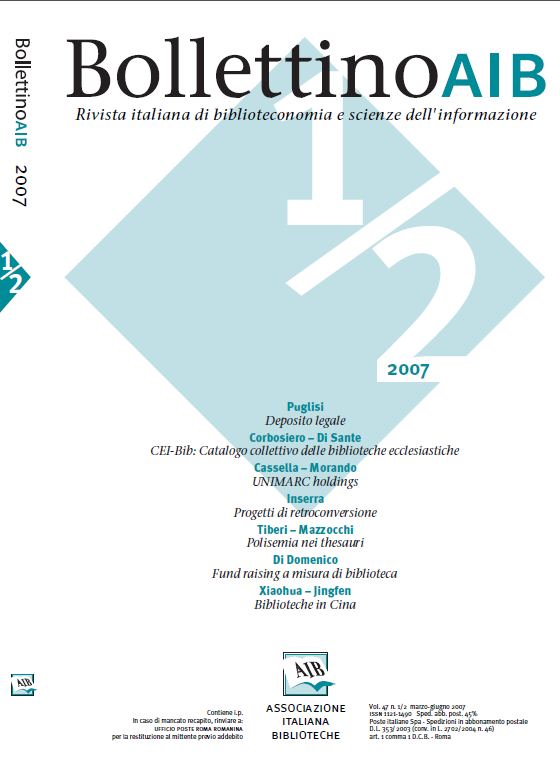The collective catalogue of ecclesiastical libraries. CEI-Bib: objectives, tools and prospects
Main Article Content
Abstract
The 14th September last, in the Pontifical Lateran University in Rome, saw the presentation of the project that the National Office of Cultural Heritage of the Italian Episcopal Conference dedicated to Diocesan libraries and those of other cultural bodies. The convention, entitled "Ecclesiastical libraries: guidelines of a shared project", was aimed at officially introducing the community of librarians to the objectives, tools and prospects of CEI-Bib, to form a collective catalogue of Italian ecclesiastical libraries, an integrated system of library management, network structure, an all-round services infrastructure. The presence of institutional and civil authorities beside religious ones was the expression of the same need: to lay, or better, strengthen the bases for a cooperation that would be able to go beyond particularisms and sectorialities in the name of a higher goal, communication of knowledge. The CEI project for ecclesiastical libraries (PBE) was begun in the summer of 2004, with the idea of mediation of the patrimony - both of books and other - belonging to the collections of ecclesiastical libraries. During recent months the work of study, research and design has led not only to establishing the reference context of the project and the main initiatives existing in Italy and the world, but also to processing some new proposals of collaboration with the ICCU and MiBAC. This was done in order to streamline, through the stipulation of a special convention, signed on December 5th, the sharing of objectives and tools for the provision and cooperative management of library services, the exchange of data for the coordinated development of the bibliographic patrimony - the management of control systems of archives of public authorities, shared monitoring through the registry office of library structures, sharing of formation tools aimed at ensuring updating and therefore the quality of the work carried out by the sector's workers.
The project required the setting up of technical tools and a logical infrastructure that would guarantee that the system would function in three different scenarios:
- communication between CEI-Bib and SBN,
- communication between CEI-Bib and certain territorial library systems,
- the integration in CEI-Bib of other already existing situations
The proposal addressed to the library community forms part of a more extensive project of mediation of the entire ecclesiastical cultural patrimony.
Article Details

This work is licensed under a Creative Commons Attribution-ShareAlike 4.0 International License.
